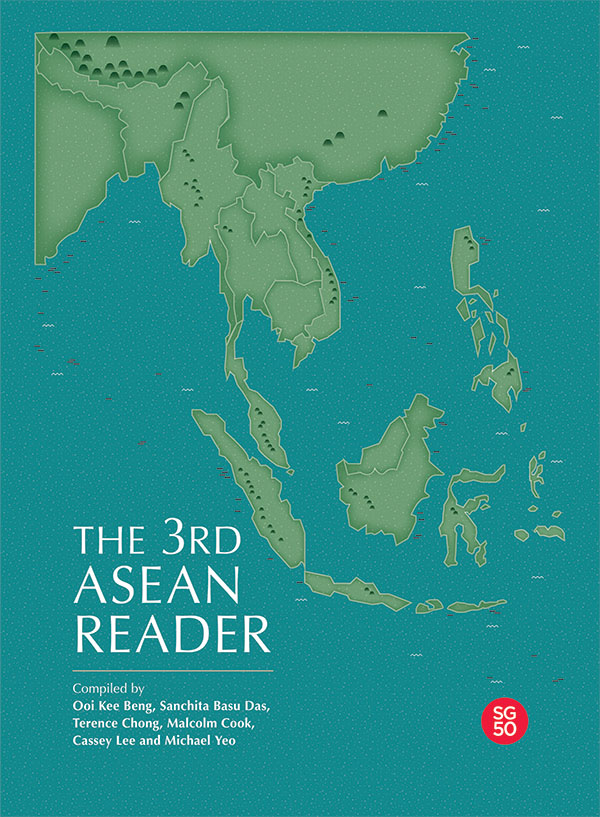Book contents
- Frontmatter
- Contents
- Preface
- Forewords to the First and Second ASEAN Reader: ASEAN: Conception and Evolution
- Forewords to the First and Second ASEAN Reader: ASEAN: The Way Ahead
- Forewords to the First and Second ASEAN Reader: New Challenges for ASEAN
- SECTION I ASEAN: THE LONG VIEW
- SECTION II COUNTRY ANALYSES
- SECTION III COMPARATIVE ANALYSES OF THE REGION
- Southeast Asian Societies
- The Southeast Asian Economy
- Southeast Asian Politics
- SECTION IV INTERNATIONAL DEVELOPMENTS
- SECTION V INSTITUTIONS OF ASEAN
- SECTION VI ASSESSING ASEAN'S INTERNAL POLICIES
- ASEAN Political Security Community
- ASEAN Economic Community
- 41 Implementing the ASEAN Economic Community Blueprint
- 42 Towards an ASEAN Economic Community by 2015
- 43 Understanding ASEAN's Connectivity
- 44 Enhancing the Institutional Framework for AEC Implementation
- 45 What is a Single Market? An Application to the Case of ASEAN
- 46 Non-Tariff Barriers: A Challenge to Achieving the ASEAN Economic Community
- 47 Towards a Truly Seamless Single Windows and Trade Facilitation Regime in ASEAN Beyond 2015
- 48 An Assessment of Services Sector Liberalization in ASEAN
- 49 Financial Integration Challenges in ASEAN beyond 2015
- 50 Free Flow of Skilled Labour in ASEAN
- 51 Toward a Single Aviation Market in ASEAN: Regulatory Reform and Industry Challenges
- ASEAN Socio-Cultural Community
- SECTION VII ASSESSING ASEAN'S EXTERNAL INITIATIVES
- ASEAN Processes
- ASEAN's Major Power Relations
- SECTION VIII SOUTHEAST ASIA: PERIPHERAL NO MORE
- Bibliography
- The Contributors
- The Compilers
49 - Financial Integration Challenges in ASEAN beyond 2015
from ASEAN Economic Community
Published online by Cambridge University Press: 22 June 2017
- Frontmatter
- Contents
- Preface
- Forewords to the First and Second ASEAN Reader: ASEAN: Conception and Evolution
- Forewords to the First and Second ASEAN Reader: ASEAN: The Way Ahead
- Forewords to the First and Second ASEAN Reader: New Challenges for ASEAN
- SECTION I ASEAN: THE LONG VIEW
- SECTION II COUNTRY ANALYSES
- SECTION III COMPARATIVE ANALYSES OF THE REGION
- Southeast Asian Societies
- The Southeast Asian Economy
- Southeast Asian Politics
- SECTION IV INTERNATIONAL DEVELOPMENTS
- SECTION V INSTITUTIONS OF ASEAN
- SECTION VI ASSESSING ASEAN'S INTERNAL POLICIES
- ASEAN Political Security Community
- ASEAN Economic Community
- 41 Implementing the ASEAN Economic Community Blueprint
- 42 Towards an ASEAN Economic Community by 2015
- 43 Understanding ASEAN's Connectivity
- 44 Enhancing the Institutional Framework for AEC Implementation
- 45 What is a Single Market? An Application to the Case of ASEAN
- 46 Non-Tariff Barriers: A Challenge to Achieving the ASEAN Economic Community
- 47 Towards a Truly Seamless Single Windows and Trade Facilitation Regime in ASEAN Beyond 2015
- 48 An Assessment of Services Sector Liberalization in ASEAN
- 49 Financial Integration Challenges in ASEAN beyond 2015
- 50 Free Flow of Skilled Labour in ASEAN
- 51 Toward a Single Aviation Market in ASEAN: Regulatory Reform and Industry Challenges
- ASEAN Socio-Cultural Community
- SECTION VII ASSESSING ASEAN'S EXTERNAL INITIATIVES
- ASEAN Processes
- ASEAN's Major Power Relations
- SECTION VIII SOUTHEAST ASIA: PERIPHERAL NO MORE
- Bibliography
- The Contributors
- The Compilers
Summary
Financial integration challenges in ASEAN beyond 2015 can be grouped into two broad classes. The first class of challenges are the regulatory and infrastructure challenges of financial market integration itself. The second pertains to monetary and fiscal policy regimes and how they are impacted by as well as how they impact on an integrated financial market in the region.
ABOUT ABIF
As a part of the AEC Blueprint, ASEAN Central Bank Governors endorsed the ASEAN Banking Integration Framework (ABIF) on April 7, 2011. Against that background, as the ASEAN financial sector is generally bank-dominated, the banking sector is a key driver in the financial integration process.
The initiative for ASEAN financial integration could be traced back to the Roadmap for Monetary and Financial of ASEAN (RIA-Fin) established in 2003. As stated in RIA-Fin, financial integration in
ASEAN is facilitated through the following initiatives:
• Financial Services Liberalization (FSB), i.e. progressive liberalization on financial services;
• Capital Account Liberalization (CAL), i.e. removal of capital controls and restrictions to facilitate freer flow of capital;
• Capital Market Development (CMD), i.e. building capacity and laying the long-term infrastructure for development of ASEAN capital markets.
In April 2011, ASEAN Central Bank Gover-nors accepted the results of the commissioned study by the team of consultants led by Professor Yung Chul Park as a reference for the ASEAN financial integration process. Central Bank Governors also endorsed the ASEAN Financial Integration Framework (AFIF) which is based on the agreed Broad Thrusts (i.e. three dimensions of FSL namely equal treatment, access and environment, milestones for ASEAN5 and BCLMV, clear set of preconditions and safeguards, financial stability, capital account liberalization, capacity building and shared responsibility, and integrated payments and settlements).
Currently, ABIF is based on four guiding principles: bringing economic benefits and financial stability for individual countries and the region, allowing flexibilities by adopting a double-track implementation for ASEAN5 and BCLMV, and achieving multilateral liberalization by 2020 (e.g. measured by the number of ASEAN commercial banks presence in ASEAN).
To ensure a successful implementation of ABIF, four pre-conditions have been agreed upon. The first is harmonization of principles of prudential regulations. The second is building financial stability infrastructure. The third is providing capacity building for BCLMV. The fourth is setting up agreed criteria for ASEAN Qualified Banks (QAB) to operate in any ASEAN country with a single ‘passport’.
- Type
- Chapter
- Information
- The 3rd ASEAN Reader , pp. 256 - 260Publisher: ISEAS–Yusof Ishak InstitutePrint publication year: 2015



